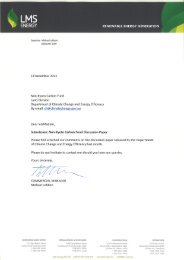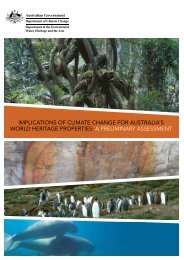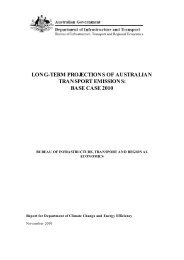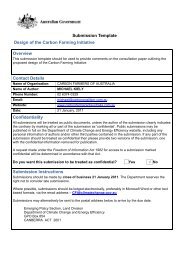Enterprise Agreement 2011-14 - Department of Climate Change
Enterprise Agreement 2011-14 - Department of Climate Change
Enterprise Agreement 2011-14 - Department of Climate Change
Create successful ePaper yourself
Turn your PDF publications into a flip-book with our unique Google optimized e-Paper software.
<strong>Department</strong> <strong>of</strong> <strong>Climate</strong> <strong>Change</strong> and Energy Efficiency – <strong>Enterprise</strong> <strong>Agreement</strong> <strong>2011</strong>-<strong>14</strong><br />
o on the job learning opportunities including special projects, taskforces and<br />
secondments;<br />
o core skill training such as writing skills, Micros<strong>of</strong>t <strong>of</strong>fice suite, project management;<br />
o strategic skill sets including policy and legislative processes, developing business<br />
cases; and<br />
o leadership skills.<br />
<strong>14</strong>.3. As part <strong>of</strong> the <strong>Department</strong>’s commitment to capability development, employees are<br />
encouraged to undertake relevant study.<br />
<strong>14</strong>.4. Employees undertaking formal study, which is relevant to business requirements, may be<br />
eligible for reimbursement <strong>of</strong> course fees up to the cost <strong>of</strong> the course and/or study leave <strong>of</strong><br />
up 75 hours per semester or agreed period <strong>of</strong> study which includes reasonable travelling<br />
time. Further details on the type <strong>of</strong> study assistance available are in the Study Assistance<br />
Policy.<br />
<strong>14</strong>.5. Identified development needs should be recorded in the employee’s performance<br />
development agreement and be reviewed on a regular basis in line with the Performance<br />
Development Framework.<br />
15. Performance management<br />
15.1. The <strong>Department</strong> understands the importance <strong>of</strong> measuring and recognising performance.<br />
15.2. The parties agree that an effective system <strong>of</strong> performance management is integral to the<br />
operations <strong>of</strong> the <strong>Department</strong>. DCCEE will develop and maintain an effective Performance<br />
Development Framework that will provide mechanisms for:<br />
o effective, two-way feedback between employees and their managers;<br />
o identifying development needs and career opportunities;<br />
o determining substantive level;<br />
o rewarding good work performance; and<br />
o managing underperformance.<br />
15.3. The Performance Development Plan is a living document underpinned by Performance<br />
Development Framework (PDF) and is intended to provide structured support for, rather<br />
than to replace, the day-to-day provision <strong>of</strong> guidance, recognition and exchange <strong>of</strong> feedback<br />
in DCCEE’s workplace.<br />
15.4. Upon commencement <strong>of</strong> this agreement a five-point scale will be used when discussing and<br />
assessing the outcome <strong>of</strong> performance and development at the End <strong>of</strong> Cycle Assessment<br />
discussions. The five point scale is ‘unsatisfactory’, ‘developing to standard’, ‘fully effective’,<br />
‘superior’, and ‘outstanding’.<br />
15.5. The underlying principles <strong>of</strong> the PDF will be based on natural justice and constant feedback<br />
aimed at ensuring there are “no surprises” in relation to performance matters.<br />
7






